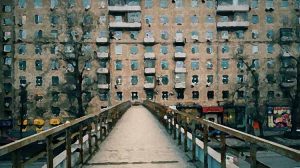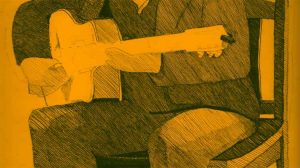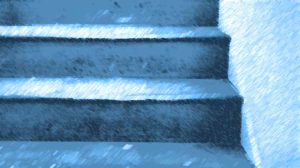
1. Under a gray sky, the sun came around a corner like a drunk with a knife, a slice of light on the ruins of our childhood: the houses, sheds, barns, and junkyards that were once our farm on County Road 1800 East, Rantoul Illinois 61866. I say it in my mind with the singsong memorization of my four-year old self.
My brother Jacob took control of the situation, asking the current owners, the Sjuitses, if we could get out of the car and take a look around. Although he’s the youngest of us five, taking control is his nature, a comfort to middle-child-me, allowing me to remain invisible in my discomfort. I couldn’t have knocked on the white door with the handle knob in the middle, that our grandma, Mary Ellen Tracy Fitton, had put in when the new house was built. I couldn’t have knocked on a door I would always think of as ours and wait for someone else to come answer.
I sat in the car in the driveway of the old house that has a crack in the vague shape of Tennessee, where the free throw line would be when we played basketball, thinking about breaking bones and cracking concrete to keep from seething at the thought of a Fitton asking permission to walk on this land, this ground, that we’d farmed for over a hundred years.
2. There have always been dreams about the farm. Its weight in my memory, its soil in my fingers. Last night, again, the farm. My family was going outside to shovel snow. There were massive, purple icicles everywhere. I was petrified they would be impaled, but never left the house, myself. Guilt. Responsibility. Inaction.
Mary Ellen was there: alive, old, confused, but still “working”—that vague, catchall term for farm people outside. Working, yes, but rarely on something that is ever actually given a name: gardens, tractor engines, combine heads, cutting down a tree that’s strangling another to death. “Working” is more of a daily worship, care for, The Farm.
I want a farm of my own to care for. But that’s the illusion of a farm, isn’t it? It’s never really yours. You’re always working for someone else, for something else, regardless of who keeps the deeds tucked in their safe, covered numerically by someone’s birthdate or wedding anniversary. The land is her own entity. She has her own soul.
Gerald O’ Hara said, “To anyone with a drop of Irish blood in them, the land they live on is like their mother.” The land is a mother who never quite lets you go. She demands love, attention, and respect. Attention, most of all. Your spouse will always come second, as will your children. She owns you; not the other way around. But God, you love her. You’d do anything for her. She raised you after all, and she’ll bury you.
So what of a landless wanderer? A little girl who was taught to love land like her mother? Her dreams become her landscape. Or rather, her abandoned land, her abandoned mother, takes her revenge in dreams.
No Fitton has lived on County Road 1800 East for fifteen years, but I don’t think the soil has been told. She houses bones of angry ancestors that scatter, bodies that expand and contract until they explode. I try to quiet her with whiskey, because she won’t let me sleep. I’m always in that vivid dream state, where she is the main character, the setting, the plot. She rocks me to sleep and then rips me to pieces.
Lucid dreaming, this morning, so many mornings:
I am four years old and I am falling asleep in a blue bean bag chair in the cab of Dad’s combine, to a lullaby of talk radio, lingering cigar smoke, and a movie reel of the combine head weaving between the rows of golden brown corn, like fingers lacing through lovers’ fingers. He is singing “Oh Danny Boy” or “Go Home with Bonnie Jean.” My eyelids drop and I drift, engulfed in safety.
I am eleven and I am running toward Middlefork Creek, where it forgets it’s a river. I am running in the middle of an autumnally empty post-harvest cornfield, when the air smells somehow both dead and alive, dodging errant stalks and sod clusters, and I could be the fastest person alive and no one would ever know, and I could be the only person alive, for all I know. I am young and intrepid, a product of my Irish and German pioneer ancestors, whose bones lay here, under the wild ground their plows broke.
My body begins to swell, suddenly. I am engorged, filling with some poisonous, gaseous substance. I clutch Illinois topsoil in my massive fist, but it slips noiselessly from my fingers, and I explode, finally, and lie, arrayed on some foreign land, in grotesquely shaped pieces of torso, toes, fingers, like a ballooned Elizabeth Short, the victim of the famous Black Dahlia murder in 1947 Los Angeles. Her crime scene gave Mary Ellen waking nightmares, as she walked from her LA bank job to her apartment weeks after the murder, silently praying the rosary, tears streaming down her face. How she must have feared that disgusting dismemberment, 3,000 miles from her home soil. But no, not her granddaughter, not me! Lying here in pieces, in Istanbul, or Vienna, or Chicago. I feel for clumps of my body in my sleep, and I am not eleven anymore. And passersby say, in a language I will never learn now, dismembered and dead as I am, “How disgusting. What waste.”
I try to scream, but I am struck with the familiar impotency of the nightmare. I wake with tears streaming down my own face, and though my body is all present and accounted for, she is no longer someone I recognize. I am clustered pieces of a whole, far from my landscape.
Perhaps I am in Istanbul, that ancient land I grew to love when I left Illinois, a migration I can only describe as suicidal, a metaphorical vein slice, the abrupt divorce of distance., once the farm was lost for good.
I imagine the pastimes of little girls I know, or little girls I once knew: the dolls and the miniature houses, the fairy tales, the delicate ecosystems that are built to shatter. What if their fairylands were real, like mine was? Wouldn’t it be more devastating to release them?
Gerald O’Hara said to his daughter, “You mean to tell me, Katie Scarlett O’Hara, that Tara, that the land means nothing to you? Why, land’s the only thing in the world worth working for, worth fighting for, worth dying for, because it’s the only thing that lasts.” I think so much of Gone With the Wind, that torrid love story of a girl and the land she loved.
As a child, I would practice Scarlett’s As God is my witness monologue, dreaming of saving our own farm, my own Tara, from decay and destruction that I never anticipated would propel themselves into my reality: if I have to lie, or cheat, or steal, or kill, I swear I will never go hungry again. I was so busy rehearsing my part: wrenching a turnip from the ground, clutching it to my chest, vowing never to go hungry again, expecting a civil war, a famine, some grand chaos, that I missed any sign of the ordinary kind, the kind of chaos that destroys families, farms, loves, friendships.
That isn’t true, entirely. I suppose I saw the ordinary chaos coming, slowly at first, and then faster and faster, in my peripheral vision, like a great warship in the Golden Horn, the geographical gulf dividing Old Istanbul from New Istanbul, a harbor for trade since the 7th Century B.C. But great wealth has always attracted great jealousy. A slow rise is often followed by a great fall. So Byzantium became Constantinople, Constantinople became Istanbul, and Fitton Farms became Sjuits Farms.
Did Constantinople know Fetih the Conqueror was coming in 1493? And what could they have done about it, if they had? We knew it was coming, that ordinary chaos, and we let it. We turned away from it.
A friend in college asked me once whether I slept on my stomach or on my back. “I sleep on my back,” he said, before I could answer. “That way if someone attacked me in the middle of the night, I’d be ready.” I told him that I slept on my stomach, but didn’t elaborate. I tried to make sense of it. I was protecting my vital organs, wasn’t I? But time and turbulence have illuminated this particularly disturbing characteristic of my personality. It’s just that I’d rather be stabbed in the back than in the front.
3. It was difficult for me to understand myself after we lost the farm. A funny verb, isn’t it? Lost. As though Dad misplaced a thousand acres of land, left it on top of the car, maybe, and accidentally drove off without it. The simple verb conjures a simple image, but the loss of the farm was much more complex, of course, and there are many theories, whispered in smoke filled sheds and over round dinner tables when my four siblings and I gather to drink and be merry. Was the bankruptcy Grandpa Fitton’s fault? Did our great uncle, Harry, store too much grain for too long, did he not know when to sell when the corn and soybean prices dipped so low and rose again? Was it all the drinking?
We were raised on the farm’s legacy, fed nostalgia in cemeteries, taught to revere dead people we would never know, people who mattered only to us, only to the farm. Their memories are buried within us, and their stories are our own.
My sister Nora and I spent summer days acting out their stories when we didn’t have to walk beans. Walking beans is an incredibly toilsome chore that requires one to walk up and down the rows of young soybeans, decapitating and uprooting the milkweeds that threaten to impede their growth. But free summer days were spent re-enacting our great grandfather’s death in its precise location. “You be the conductor, Nora, and I’ll be Grandpa Gordon,” I’d say.
“You’re always Grandpa Gordon! Why do I have to be the conductor?”
“Because you don’t fall right. You use your hands. Let’s do it one more time.”
“LUDLOW! Train doesn’t stop for LUDLOW!” she’d bellow obediently. The train slowed down, but didn’t come to a complete stop in Ludlow in those days. Now, trains from Chicago to New Orleans don’t even slow down there. Ludlow is a town of only three hundred souls and some change, and its village lines border Rantoul to the north. The Gordons and the Fittons of this property were always a world unto themselves, never quite belonging anywhere.
From my vantage point, standing on top of the stepladder we’d haul down to the train tracks, I could see our new house, Uncle Harry’s two story yellow one, and the old white farmhouse, where Ray and Mary Ellen lived, at least when the corn was low.
Grandpa Gordon never got to live on the farm, in any of those houses. He was stepping off the train, on the Illinois Railroad, the longest stretch of straight track in the United States. When Dad told the story, someone called Grandpa Gordon from inside the train, he turned mid-step, and stumbled. He lost his balance, fell off the moving train, hit his head, closed his eyes, and never woke up. But that part wasn’t too sad, really. After all, who cared about someone we’d never even met? The only sad part, the thing that made me choke up when I repeated the story, even as a child: “Grandpa Gordon never did get to live on the farm.”
4. For my fifth birthday, I got a black kitten, and named her Chanute, after Chanute Air Force Base in Rantoul. The Air Force closed not long after that, leaving dilapidated buildings strewn across 1800 East, across our farm land. My black cat Chanute wandered, and mated, and multiplied, as farm cats and farm daughters are wont to do. I saw her sometimes, in the corncrib with a swollen kitten littered belly, or by the well with a sagging, unrecognizable body, transformed by a process that I didn’t understand occurred across species until my older sister showed me the road map her stomach had become after giving birth to her first daughter. I touched the stretch marks and the bruises, and my eyes filled with tears.
Chanute filled me with sadness, and we kept our distance from one another.
When Chanute Air Force Base closed, jobs dried up and disappeared, and many of the people followed suit. I spent my teenage years racing through the vacant streets of what is still referred to as “The Base,” careening around huge, asbestos filled buildings, drinking whiskey with my friends in overgrown parking lots, reclaimed by foliage and prairie grass. When I learned about lost civilizations in school, I thought of the errant plane engines, the shuttered houses, the fenced-off tanks and debris, and understood quite clearly what it meant to be a lost civilization. We were already living among forgotten ruins. But the farm was still thriving, then, despite the decay licking at its edges. Teenagers spray-painted graffiti on the sheds sometimes, but we were there to paint over it.
We were there to love the farm, then. My father fought back the debt he’d inherited from his parents with clenched fists and bottles of Canadian Club, but disaster loomed with the dropping corn and bean prices.
I began to blame myself, and maybe I still do. I still do. I do. Why couldn’t I have been more like Scarlett? I can see the pattern of blame across my body, when I stand naked in front of the mirror: the food and sex and whisky I put into myself to make it go away.
My father’s sister Teresa is fifty-seven years old, and weighs roughly ninety pounds. Her brittle bones fracture during the quick, dream induced, nighttime tossing that the rest of us do naturally, without waking. I look at her body juxtaposed with mine: her wrist bones that jut out like crooked gravestones, while my own are barely visible: her hips, over which even the narrowest jeans slide and plunge, while mine protrude outward, spread in both directions, as though they’ve forgotten that they share one body. It’s the juxtaposition of deprivation and overindulgence, but we’ve both been cultivating the landscapes of our bodies, void of our home soil. My father cried at Teresa’s wedding. I asked him why. He said, “She will never live on the farm, again.”
5. We sold the farm the summer before my senior year of high school. We packed up all the houses, but it will be years before the moving is done. It still isn’t done. It will never be “done.” There’s a storage unit in Rantoul with Mary Ellen’s roundtable, built especially for her, from cedar. I see her getting up from her coffee and subconsciously wiping it down every time Uncle Matt told the story of his friend from college who brought his boa constrictor over and set it on the table. There’s a basement full of Mary Ellen’s movie posters in trunks and boxes, her life’s collection. There’s a burn pile out by the old house with the frame of Grandpa Gordon’s Model T Ford, collecting rust, with our old swing set unceremoniously strewn across it.
The word “move” doesn’t apply to a hundred year old homestead. Some things stay and decay. Others scatter, and will continue to scatter.





Leave a Reply